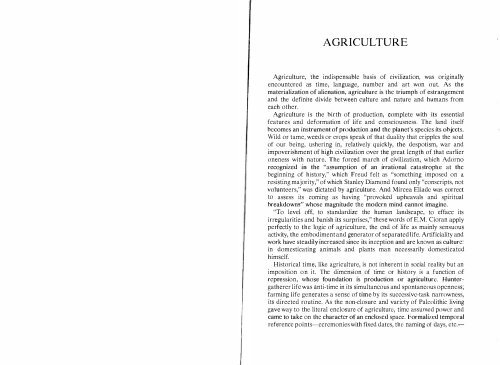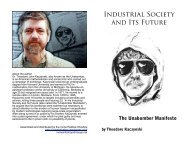CONTENTS - ouroboros ponderosa
CONTENTS - ouroboros ponderosa
CONTENTS - ouroboros ponderosa
You also want an ePaper? Increase the reach of your titles
YUMPU automatically turns print PDFs into web optimized ePapers that Google loves.
AGRICULTURE<br />
Agriculture, the indispensahle basis of civilization, was originally<br />
encountered as time, language, number and art won out. As the<br />
materialization of alienation, agriculture is the triumph of estrangemcnt<br />
and the definite divide between culture and nature and humans from<br />
each other.<br />
Agriculture is the hirth of production, complete with its essential<br />
features and deformation of life and consciousness. The land itself<br />
becomes an instrument of production and the planet's species its objects.<br />
Wild or tame, weeds or crops speak of that duality that cripples the soul<br />
of our being, ushering in, relatively quickly, the despotism, war and<br />
impoverishment of high civilization over the great length of that earlier<br />
oneness with naturc. The forced march of civilization, which Adorno<br />
recognized in the "assumption of an irrational catastrophe at the<br />
beginning of history," which Freud felt as "something imposed on a<br />
resisting majority," of which Stanley Diamond found only "conscripts, not<br />
volunteers," was dictated by agriculture. And Mircea Eliadc was correct<br />
to assess its coming as having "provoked upheavals and spiritual<br />
breakdowns" whose magnitude the modcrn mind cannot imaginc.<br />
"To level off, to standardizc the human landscapc, to effacc its<br />
irregularities and banish its surprises," these words of E.M. Ciaran apply<br />
perfectly to the logic of agriculture, the end of life as mainly sensuous<br />
activity, the embodiment and generator of separated life. Artificiality and<br />
work have steadily increased since its inception and are known as culture:<br />
in domesticating animals and plants man necessarily domesticated<br />
himself.<br />
Historical time, like agriculture, is not inherent in social reality but an<br />
imposition on it. The dimension of time or history is a function of<br />
repression, whose fo undation is production or agriculture. Huntergatherer<br />
life was anti-time in its simultaneous and spontaneous openness;<br />
farming life generates a sense of time by its successive-task narrowness,<br />
its directed routine. As the non-closure and variety of Paleolithic living<br />
gave way to the literal enclosure of agriculture, time assumed power and<br />
came to take on the character of an enclosed space. Formalized temporal<br />
reference points-ccremonies with fixed dates, the naming of days, ctc.-






